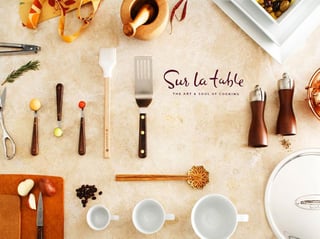Reimagining Retail: Sur La Table
Recently, I was in my kitchen making Veal Provençal for my kids. As I reached for the can of peeled tomatoes, my worn out can opener broke in my hand. I turned to my Alexa device and told it to order a new can opener from Edlund. Two days later, the package awaited me when I got home.
As I was ordering the can opener, I thought of Sur la Table, a brand I really love. They’re a truly amazing company, with a great brand, wonderful stores, high quality standards and strong market recognition. Yet, when I needed a new can opener, I turned to Amazon.
This got me thinking about the future of Sur la Table’s and other retailers of commoditized goods. If, as a retail professional, I prefer to buy top-of-the-line kitchen utensils from Amazon, who’s left to shop at Sur la Table? How can they re-enchant their customers?
Repackage value
You’ve heard this before, but the fact is, product differentiation is hard to come by. Brands engage either in a race to the top or a race to the bottom; the product-quality middle ground is shrinking drastically. Brands now have to compete by either offering better convenience and customer service, or by becoming a destination, offering value-added experiences to their customers. While private label is great, it’s not enough.
At NRF Retail’s BIG Show 2017, Sir Richard Branson told retailers, “Don’t think of yourselves as retailers: invent new things.” And he’s right; there is no medal for showing up in retail. Manufacturers, retailers and brands that do not differentiate by providing ancillary value on top of their products are going the way of the dinosaurs.
That’s why I think Sur la Table should keep developing its cooking classes and experiential offerings. There are a whole bunch of ways I can buy a new chef’s knife, but by going to the Knife Skills 101 class, I’m much more inclined to buy it on the Sur la Table website or in store.
Likewise, the online cooking classes are a boon; my daughters get really excited following along, and it’s a treat for me to cook along with them. It now makes more sense to go to Surlatable.com than on Amazon for a pasta maker.
Showcase new product innovation
In the relatively near future, 3D printers, edible and non-edible, will be in every home. Currently Surlatable.com beams recipe videos, and it should prepare to beam instructions directly to a 3D food printer. Gaining an early lead strengthens the website’s standing as a destination for cooking buffs and the upsell potential is huge. Customers could customize 3D printed kitchenware by color, size, or handle shape.
Sooner rather than later, retailers will pivot to selling printing instructions for daily needs, rather than actually selling the things. Sur la Table could start with the silicone spatulas and other small utensils it sells, and as 3D printing takes flight, expand its offering.
Sur la Table is also very well placed to retail and maintain a network of 3D food printers. The value derived from owning the data produced by these devices, and retailing the ancillaries linked to them, is tremendous.
Build a community to capture the Network-effect
For a recent Christmas party, my wife and I hired a great local independent chef. Her skill at preparing and presenting delicious foods fits perfectly with Sur la Table’s universe and I can’t recommend her enough to all my friends. Yet there does not seem to be a space for her to appear and connect with other cooking fans, amateur or professional, on the Sur la Table website.
Although Sur la Table has taken steps to nurture its online community through its blog, it really hasn’t deviated from the traditional e-commerce model, and hasn’t tried to leverage and engage its community. By creating a platform on its website, skilled chefs, caterers and artisans could get in contact with customers and offer their services. In exchange for being referenced on the website, Sur la Table could charge vendors for each sale they make on the platform. Creating this space would not only generate profitable revenue for Sur la Table, but it would also strengthen ties with customers.
Exceed expectations by offering more
It turns out that the market for nutmeg grinders is underserved by Sur la Table. As of this writing, surlatable.com only offers two results for “nutmeg grinder.” Amazon returns nearly 300.
It doesn’t make sense for Sur la Table to hold such an inventory – even for the higher-grade ones, but neither does Amazon. In fact, Amazon stocks only high-turnover inventory. Amazon and other forward-thinking retailers serve their long tail of customers by enlisting the help of third-party vendors. These third-parties satisfy niche demands from Sur la Table’s customers, while absolving it of the need for costly inventory and fulfillment capacities.
By letting third parties own and sell inventory on their website, Sur la Table could answer a wider portion of customers’ needs, and hew closer to its promise of being the art and soul of cooking. Sur la Table would still own the customer relationship and retain customers’ loyalty, while sellers would gain exposure from Surlatable.com’s traffic.
These are only a few of the ways Sur La Table can efficiently transition from being “just” another retailer to embracing becoming an ecosystem, retaining ownership of their domain whilst exceeding customers’ expectations.
The recipe is not set in stone but like cuisine, retailers need to evolve, respectful of traditions but thinking forward to re-enchant our experience and palate.






